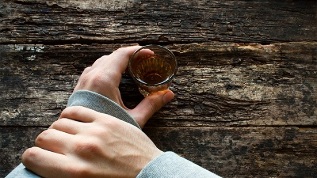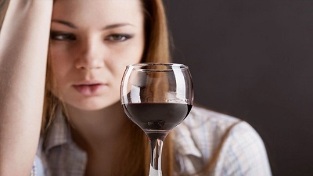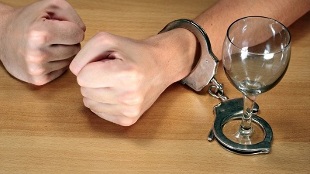Alcohol is a legal drug that, according to statistics, is regularly consumed by 8 out of 10 people. In addition, in most cases, even if a person drinks alcohol every day, they will not consider themselves sick or addicted. About 20% of active people drink alcohol at least three times a week, another 50% - once a week, and only 20% drink less than 2-3 times a month. But even if you use it a few times a month, a person gets both psychological and physiological addiction. In this article, we're going to talk about how to stop drinking alcohol on your own, why you should, and how not to break down again.
Introduction

Everyone knows that alcohol is addicting. Everyone also knows that alcohol is poison in any dose, but they continue to use it.
It is practically impossible to quit alcohol alone after several years - a person gets so used to resting on vodka, champagne, beer, and wine that they simply cannot imagine life without drinking. Therefore, people only stop drinking if they are actually encrypted or if their state of health does not allow it.
Drunkenness leads to a deterioration in the population, its extinction, a decline in general culture and literacy. We therefore recommend that absolutely all people reconsider their attitudes towards alcohol and reduce consumption at least once or twice a month if they do not give it up completely.
If there is an alcoholic in a family, life in that family is conflicted and problematic. There is often not enough money for clothing and food, children and spouses live in constant stress, scandals and fights often arise in the family. This pattern of behavior becomes the norm for children and is then repeated in adulthood.
Can you stop drinking yourself?
If you want to know how to stop drinking forever, there is no one-size-fits-all answer to the question. This process is individual for everyone. Someone simply refuses to drink alcohol, realizes the danger, someone goes beyond their norm and almost dies with an abscess, someone loses their job or the respect of friends, after which they make a decision.
But the main thing is that the person is aware of the existing problem and tries to solve it by all means. Without this, it is impossible to overcome addiction and cravings for alcohol. The patient has to set a goal and move towards it, otherwise nothing will come from him.

Very often the rejection process is associated with a complete replacement of the social circle and even the place of residence - it is difficult for a person to give up the habit of sitting with drinking friends in the evening, having something to do with colleagues at the next company partydrinking or celebrating buying new pants with neighbors.
Remember that the psychological cravings for alcohol are very strong and it is quite difficult to deal with it on your own without changing your habits.
It must be ensured that the patient has no free time. Get busy, find a hobby, hit the gym or pool to meet new people in a non-drinking environment. A hobby should bring joy, capture, feed adrenaline - you can easily push alcohol out of your life once you've received something new and useful.
The main goal is to just forget about vodka, beer, and wine - you don't need alcohol to have a good time.
Alcohol is an insidious enemy that causes psychological addiction.
Why alcohol is harmful
So you already know how to start the fight. To get you started, let's list the main harm that alcohol does to a person:
- Health is deteriorating.Many men who drink heavily die from heart problems between the ages of 35 and 45. Alcohol poisons the liver and kidneys, the central nervous system, leads to deformation of blood vessels, adversely affects sexual function and reduces immunity. If a person has been drinking for more than 10 years, the risk of giving birth to healthy offspring is zero. He develops heart failure and significantly increases the risk of cancer and tuberculosis.
- Social relationships are deteriorating.The family treats an alcoholic extremely negatively, many friends and acquaintances turn away from people who drink constantly because they behave aggressively and constantly borrow money "until payday". In addition, in a state of alcohol intoxication, there are a large number of crimes - thefts, murders, hooliganism.
- The financial situation is deteriorating.Alcohol is quite expensive and needs a snack these days, so even traditional gatherings cost a pretty penny. A person stops taking care of himself, taking care of his appearance, he spends money on drinking, and not on his family, as a result of which absolutely everyone who is associated with an alcoholic suffers. In addition, such people are often fired because they are unreliable and few people like the smell of fumes.
Is it dangerous
to throw?
There is a myth that it is impossible to suddenly stop drinking because a person may withdraw. This only applies if the patient has binge eating and drinks for more than 3-5 days. In this case, you really can't just stop drinking - you will either have to take him to the hospital for a drop or get him out of this condition at home in 2-3 days. If a person consumes infrequently and does not have a seizure, they can stop drinking without any problem.
Why can't you get out of the binge abruptly? Because the body is poisoned by alcohol and aldehydes, it runs on alcohol, so failure can lead to:
- Additional stress on the heart.
- Increased pressure, excessive stress on blood vessels.
- The occurrence of strokes and heart attacks.
- hallucinations. Because of the effects on the central nervous system, the alcoholic may experience persistent auditory and visual hallucinations.
- Falling into depression that leads to serious mental illness and even suicide.
Therefore, if you have already entered the binge, you need to walk gradually and correctly (preferably with medication). Or read the rules to get out of this state at home.
How to stop drinking alone
Let's find out how to stop drinking alcohol yourself without resorting to coding or the help of a narcologist. To do this, you must want to cope with your illness, or at least realize that it exists. Allen Carr's book helps someone stop drinking, someone else concludes that alcohol is poison and contains nothing good. In general, you need to be prepared for what you need to exit. Otherwise, you'll slide all the way down and die much earlier than the due date.
The second step is the development of intolerances. There are many ways to do this, but we recommend using traditional home remedies.
These include:
- Strong decoction of St. John's wort. Buy it at the pharmacy, put 4 tablespoons in a saucepan and pour half a liter of strong boiling water. Let it steep for about half an hour, after which you take the product 30-50 grams at a time twice a day. After about 10-12 days you develop a persistent aversion to all alcohol.
- Buy bearberry leaves from the pharmacy and brew 2 tablespoons in a glass of boiling water (you can boil the mixture for an additional 5-10 minutes). Take this broth 4-6 times a day.
- Take a kilogram of oats, rinse well, put in a saucepan and fill with water (you can use one and a half liters of water so that all the grain is covered). Pour about 100 grams of marigold into the mixture, boil the broth for 20-30 minutes, then leave in a warm place for 12 hours (you can wrap the pan with a towel). You need to drink the broth in a full 200-gram cup three times a day.

If you stop drinking, give up 100% of the alcohol, otherwise you will fail again.
Now let's look at tinctures that will help you develop alcohol aversion. Here are the three most common recipes:
- The root of lovage and bay leaf is poured into a glass of moonlight or vodka, the tincture is infused for 10-14 days. Then it is filtered and offered to the patient (dose 50-100 grams). He, who cannot bring himself to bear, drinks, whereupon he begins to vomit violently. Repeated use leads to aversion to alcohol.
- Clefthoof leaves are steamed in a glass of boiling water and infused in a dark, cool place for 10-14 days. Then 100 g of tincture is mixed with 100 g of vodka and offered to the patient. He drinks and vomits violently. The fixation effect is repeated one more time.
- Centaury, wormwood and thyme are taken in equal doses of 1 tablespoon each. The mixture is poured with boiling water and infused for 2-3 hours. Then it is filtered and given to the patient 50 grams 4 times a day.
Tea can also be used - it is ideal for quenching the drinker's thirst.
Use the following recipes:
- Take 15-20 grams of dry mint, wormwood and yarrow. Fill them with water and add calamus and juniper berries (about a liter of boiling water). Let it steep and then drink 2 times a day.
- 30-40 grams of wormwood, St. John's wort and yarrow, 20 grams of angelica and caraway seeds, 10 grams of juniper and 30 mint. Mix and grind all of these ingredients. Then take a tablespoon of the finished mixture, pour 250 ml of boiling water over it and drink it twice a day.
A person trying to get away from alcohol is generally advised to drink as much as possible so that the fluid dilutes the blood and removes any remaining poison. Remember, it is possible to stop drinking alcohol. You may not succeed the first time and a breakdown ensues. However, when you are determined to overcome illness and addiction, there are fewer absences and periods of sobriety - more and more. Squeeze alcohol out of life and replace it with something interesting. You will succeed!


























